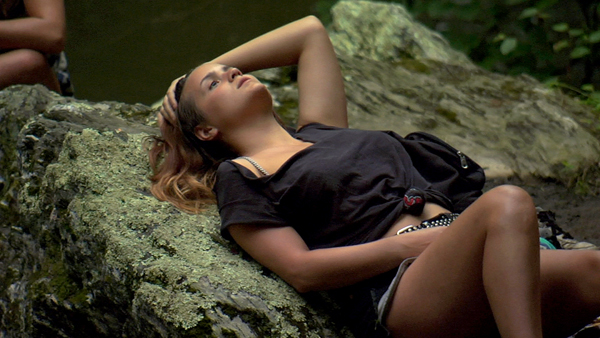|
Reviews of Recent Independent, Foreign, & Documentary Films in Theaters and DVD/Home Video

PUTTY HILL In the sleepy suburbs outside of Baltimore, a community absorbs the sudden loss of Cory, a 24-year-old man whose secret drug abuse became very public after an overdose. Through candid interviews with a cast of mostly local and non-professional actors, writer and director Matt Porterfield creates a piece that’s somewhere between narrative and documentary. It’s not a doc, but it sure looks like one, and though it’s a fictional story, it gives the impression of having actually happened. Porterfield apparently salvaged the cast and locations of a more conventional feature when its financing fell through. He and his creative team were obviously deeply immersed in this specific time and place and took advantage of the knowledge to push the idea of what narrative realism could be. Cory’s extended family and the surrounding community are in a low socio-economic stratum, their pursuits ranging from tattoo art to skateboarding. They make multiple references to peddling drugs and spending time in prison, and the outlook shared by everyone in this town is bleak. Nobody seemed to know Cory had a heroin problem, but it doesn’t come as much of a surprise, and likewise his death seems less a sad event itself and more a reminder of the sorrow of life in general. “Anybody who says jail does anyone any good is a fuckin’ liar,” says tattoo artist Spike in one of the opening scenes. Charles Sauers plays the prickly Spike, a standout along with brothers Dustin and Cody Ray as two of Cory’s close friends. As freeform as the film is, though, I’m walking away feeling a little swindled. It’s like the director staged his own vérité. The interviews are beautifully designed, organic, and feel as insightful as any “direct cinema” could achieve, yet the camera keeps finding itself in impossibly perfect vantage points. Porterfield and editor Marc Vives often use multiple angles of the same (supposedly spontaneous) event. The film consistently anticipates where the characters will walk, what their mood will be, and even which specific characters will be important to film. In other words, unlike in a traditional documentary, the director is always in control here. There’s a poetic, esoteric, and brilliant film in Putty Hill that’s somehow being stifled. Credibly depicting a demographic and being hyper-aware of a unique setting contribute to great storytelling, but they’re not the only elements to be aware of, and in the case of Putty Hill, they make the film feel very lopsided. I very much enjoy watching the members of this community, especially during the funeral sequence, which takes place during the day at a karaoke bar and features an amazing, impromptu version of “I Will Always Love You.” And I appreciate the skill involved in rendering each individual portrait, but the film’s themes are undeveloped and understated. The film is too sparse for its message, if it has one, and Porterfield relies too heavily on a manufactured realism that, while innovative and interesting to watch, ultimately leaves too little for its viewers to grasp. This is a
film I really wanted to be floored by, which is why I’m holding
it to such a high standard. What’s more, my
truth sensor is on extra high alert in a case like this one, and I’m
extra disappointed when, in the end, the film is lacking. There are
extraordinary moments here, don’t get me wrong, I just wanted so much
for this innovative style to offer something more to walk away with, but
alas. There’s just not enough movie in this movie.
Michael Lee
|

